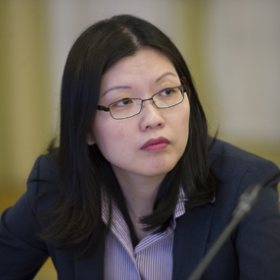
EWI's Piin-Fen Kok on Channel NewsAsia about Implications of Abe-Aquino Meeting
On June 24, 2014, Japanese Prime Minister Shinzo Abe met with Philippines President Benigno Aquino in Tokyo to discuss bilateral cooperation. Piin-Fen Kok, director of EWI’s China, East Asia and United States Program, talked to Channel NewsAsia about the implications of the meeting, and how countries in Southeast Asia are shifting their behavior in response to China's actions in the South China Sea.
Excerpts from her commentary:
On the possibility of evolving defense ties between Japan and the Philippines following the Abe-Aquino meeting:
"I do think there will be closer defense ties; Prime Minister Abe has already advocated a more active security role for Japan in the region. As he mentioned in his speech at (the) Shangri-La (Dialogue), Japan has actually committed to providing the Philippines with a number of modern patrol crafts, and will be giving, or selling, a number of communications systems as well as providing training for the Philippines coast guard, presumably to help with maritime enforcement that would include dealing with China in contested waters."
On Japan's claim to deliver "utmost support" to Southeast Asian nations locked in territorial disputes with China:
"In his speech at Shangri-La, Prime Minister Abe said that maritime disputes should be resolved through international law, and he mentioned the rule of law of the sea and airspace and all of that, so I think in that regard he will be supporting Southeast Asian nations’ efforts to bring about a code of conduct in the South China Sea. As we’ve seen in the case of the Philippines, Japan will also support individual ASEAN countries bringing their case to international tribunals against China."
On whether the Philippines is concerned that Japan is looking to ramp up its security capabilities:
"I think there will always be lingering concerns in the region about Japan’s past some 70-odd years ago. It is up to Japan at this point, I believe, to state its case, explain clearly why it is re-interpreting Article 9 of its constitution, and to explain why that move will be a good thing for Asia’s security, rather than a bad thing."
On possible fears in Beijing that its recent actions may prompt regional nations to rally against it:
"Several other countries, including countries that themselves have territorial disputes between them, are coming together and meeting and trying to coordinate approaches—whether it’s to avoid incidents at sea and in the air, or to exchange information on how to manage a more assertive China. This might increase the pressure on China and make it feel more and more encircled. It may actually feel that it needs to take more assertive actions to respond to what it views as unreasonable behavior on the part of its neighbors, and that is not good in terms of reducing conflict in the South China Sea."

